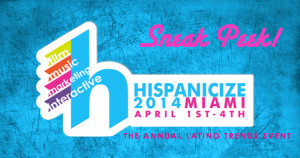Social media: Filling its own niche and finding challenges

By Marianela Toledo | Florida Watchdog
MIAMI — Social media is changing the world in more ways than is often realized.
That was made clear at Hispanicize 2014, an event that brought together some 1,500 Latino trendsetters and newsmakers in social media, journalism, advertising, public relations, film, music and innovation who participated in four days of talks on the latest and greatest in social media.
LATINO POWER: Hispanicize2014, That was made clear at Hispanicize 2014, an event that brought together some 1,500 Latino trendsetters and newsmakers in social media, journalism, advertising, PR, film, music and innovation who participated in four days of talks on the latest and greatest in social media.
The event was a techie’s feast of creative endeavors, new products, technologies and marketing campaigns. But it’s important to note that as social networks and blogs increase in influence, they will face the same challenges that traditional journalists have faced for years — to ethical, moral and legal standards.
Roger Shuler, publisher of Legal Schnauzer, learned the hard way that while the pen is mightier than the sword, it can also get you into hot water.
Shuler spent five months in an Alabama prison because he refused to remove comments from his blog claiming that former Alabama Gov. Bob Riley’s son had had an extramarital affair. Shuler was arrested for contempt of court and resisting arrest, and was released from prison after removing the comments.
In March, Alex Kibkalo, a software architect for Microsoft, was arrested for leaking Windows 8 to an unnamed tech blogger. As a result of this case, Microsoft was forced to tighten up its privacy policies on its email accounts after admitting to having read emails from the blogger’s Hotmail account in its quest to track down the internal leak.
In another case, billionaire David Einhorn’s firm Greenlight Capital sued investment research website and blogging forum Seeking Alpha to reveal the name of the anonymous blogger who wrote that the company was secretly buying up shares in a tech company. Greenlight claimed the only people who know about its purchases of the tech company’s stock were “legal counsel, prime and executing brokers, fund administrator, and other agents.”
In Miami, Nelson Horta, a blogger and journalist for Nelsonhortareporta.com, was sued by Sinapsis, the baggage-wrapping contractor at Miami International Airport, for writing in his blog the firm had committed several violations in its contract with Miami-Dade County. The courts ruled that Synapse failed to prove the blogger had libeled them.
Social media making its mark in politics
The influence of social media is also demonstrated in cases like the so-called Arab Spring, a series of revolutionary demonstrations in the Arab world that began in December 2010 and ultimately lead to the ousting of several rulers. The protests used techniques of civil resistance that included strikes, demonstrations, marches and rallies, much of it organized through social media.
Arab Spring was so significant the movement was credited with coining popular terms like “Twitter Revolution” and “Facebook Revolution.”
The U.S. government also recognizes the power of social media, as it puts it, to “renegotiate the balance of power between the state and society.” This week, the Associated Press reported that in 2010 the United States secretly funded a social media project called ZunZuneo, a “Cuban Twitter,” with hopes of stirring unrest in the island nation.
Documents show the U.S. government planned to build a critical mass of subscribers through “noncontroversial” content and then begin including political content aimed at inspiring Cubans to organize “smart mobs” — mass gatherings called at a moment’s notice — that might trigger a Cuban Spring. Washington denies the program was covert.
Cuban blogger Yoani Sanchez said during the Miami event that Cuba couldn’t access the Internet freely. By using USB drives, however, Cubans are moving files from person to person until they could find a computer network to store their information. She noted it was among the most effective ways to inform the community.
Private companies, too
If Murphy had a law about the written word, it might go something like this: When something is written, it automatically becomes true. A survey conducted by Webershandwick.com showed that nearly 80 percent of American consumers surveyed trusted reviews or tips they read in popular blogs and websites.
That’s no small sphere of influence when you take into account the number of bloggers on the Internet expressing their every thought. According to Blogworld.com, in 2012 there were more than 31 million bloggers in the United States.With a negligible regulatory framework in place, experts say we should look to major changes ahead.
One change came in 2009 when the Federal Trade Commission revised its Endorsement Guides to include blogs.
“These guidelines are for guidance and are (therefore) not legally binding. But they are important because they help advertisers and endorsers to comply with Section 5 of the FTC Act, which prohibits unfair or deceptive acts or practices in commerce,” FTC spokeswoman Betsy Lordan told Florida Watchdog last year.
Social media gurus are trying to readjust as new ways of communicating through social media arise. When growth occurs, each needs to find their own niche. Communicating to a wide audience comes with its benefits, but it also comes with responsibilities and consequences.







